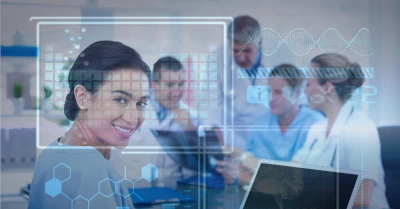
Professionals in health informatics specialize in acquiring, managing, and utilizing health-related information to improve care and decision-making.
While many start as nurses, doctors, or dentists, it’s not a prerequisite.
With the right training—typically a master’s degree—you can pursue this exciting field and contribute to the evolving intersection of healthcare and technology.
Find a Program Near You
AL Alabama
AZ Arizona
AR Arkansas
CA California
CO Colorado
CT Connecticut
DE Delaware
FL Florida
GA Georgia
MA Mass
MI Michigan
MN Minnesota
MS Mississippi
MO Missouri
MT Montana
NE Nebraska
NV Nevada
NH New Hampshire
What is Health Informatics?
Health informatics is the systematic application of information science, computer technology, and data analysis to improve public health practice, research, and education. By integrating disciplines such as computer science, public health, and information technology, health informatics serves as a critical tool for managing health data effectively, ensuring privacy, and creating systems that support evidence-based decision-making.
In general, informatics is an area of developing technology that focuses on using computer applications and design concepts to improve the human experience. It’s defined as the science of information, the practice of information processing, and the engineering of information systems. Informatics is used in many different settings, including social organizations, especially those concentrating on human biology.
Health Informatics Career
A career Health Informatics might be right for you if:
- You have a knack for technology
- Enjoy helping others solve problems and find solutions
- Find joy in analyzing data to uncover meaningful insights
What are Master of Informatics Degrees?
Informatics master’s degrees can be pursued from a variety of angles. Depending on the work a student wishes to do after graduating, doctor the courses taken may vary greatly between students. One of the most common Master of Informatics degree is in health care, physician as it focuses on biology. Health informatics is the convergence of information science, doctor computer science and health care.
Graduates of this degree are prepared to lead organizations as they develop and implement clear health informatics strategies to improve patient care and ensure access to information. This degree specialization also allows you to gain insight into the resources and methods required to optimize the use of information technology in the areas of nursing, clinical care, pharmacy, public health and medical research.
You can also find programs available in computation informatics. Computer science oriented informatics is also popular and focuses on broad instructions in theories and applicable concepts behind informatics. Overall, informatics programs are deeply interdisciplinary and are taught by faculty coming from many areas of study such as computer science, psychology, anthropology, education, organizational science, new media arts, and others.
Though the concentrations in informatics are varied, the common thread that links them all is that you will learn how to develop technological and organizational solutions. You may take courses in database management, prototype design development, project management, system analysis and system designs, and study the structure, algorithms, behavior, and interactions of natural and artificial systems that store, process, access and communicate information. When searching for a Master of informatics degree you should look for programs with lots of classes in your area of interest. Most programs take two years to complete, although credit hours depend on your interest and program.
Components and Functions of Health Informatics
Public health informatics involves designing and implementing health information systems tailored to track and address global health challenges. Key components include:
- Health Data Standards and Integration: Establishing frameworks like HL7, ICD, and SNOMED to ensure interoperability across electronic health records (EHRs), surveillance systems, and other platforms.
- Data Privacy and Security: Protecting sensitive information by adhering to regulations like HIPAA and implementing robust cybersecurity measures.
- System Design and Implementation: Mapping data flows and designing functionalities that enable efficient public health responses.
- Visualization and Reporting: Transforming complex datasets into actionable insights for public health officials and the broader community.
How Health Informatics Benefits the World
Health informatics enables faster identification and response to health crises, such as disease outbreaks. For instance, tools like the CDC’s FluView visually represent influenza data, empowering policymakers, scientists, and the public to take informed actions. It also helps reduce infant mortality, monitor chronic diseases, and track progress toward global health goals by integrating real-time data across diverse systems.
By bridging the expertise of informaticians, public health professionals, and technologists, health informatics fosters collaboration and innovation. This synergy creates solutions that not only improve population health but also enhance the efficiency of health systems globally, paving the way for a healthier, more informed world.
